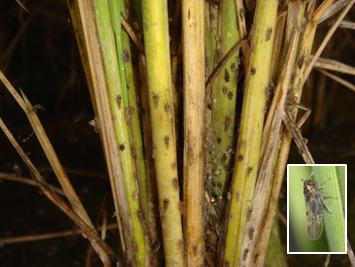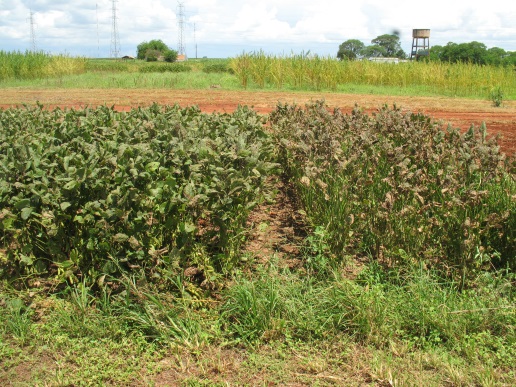“Pest and Disease Control” Development of technologies for the control of migratory plant pests and transboundary diseases
2025-08-04
“Pest and Disease Control” Development of technologies for the control of migratory plant pests and transboundary diseases
Some insect pests and diseases spread transboundary, damaging crop production. It is difficult for any country alone to combat the pests and diseases; therefore, cooperation with surrounding countries is necessary.
We will focus our research on migratory rice planthoppers (Fig. 1), which are abundant in Southeast Asia and Japan; desert locusts, which form large swarms; and leafhoppers, which transmit sugarcane white leaf disease, the most important disease in sugarcane production in Southeast Asia. Against rice planthoppers, we will obtain information about their occurrence, insecticide resistance and natural enemies, as well as the resistance of rice varieties in order to develop control techniques. Against desert locusts, we will elucidate the factors that provoke phase polyphenism (from solitary to gregarious form) by conducting field observations. Against leafhoppers and sugarcane white leaf disease, we will develop an integrated pest management method for healthy seed cane production based on the ecology of the vectors.
Fungicide application has been found effective in controlling the wide dissemination of airborne diseases such as rice blast or soybean rust. However, fungicides need to be applied regularly, thereby increasing application costs and the risk of developing fungicide-resistant strains. JIRCAS, through international research networks that it has constructed, will develop rice breeding lines resistant to blast for Asia by incorporating field resistance genes as well as soybean cultivars resistant to rust for South America by pyramiding resistant genes (Fig. 2).
Related articles
Related Pages
Article and Publication
2023
-
Yamanaka, Naoki , Kato, Masayasu , Akamatsu, Hajime , Yamaoka, Yuichi (2023) Manual de laboratorio para estudios sobre la resistencia a roya de la soja. , :1-55. https://doi.org/10.34556/0002000881
-
Yamanaka, Naoki , Kato, Masayasu , Akamatsu, Hajime , Yamaoka, Yuichi (2023) Laboratory manual for studies on soybean rust resistance. , :1-55. https://doi.org/10.34556/0002000882
Laboratory_manual_v.27.13.6 MB


